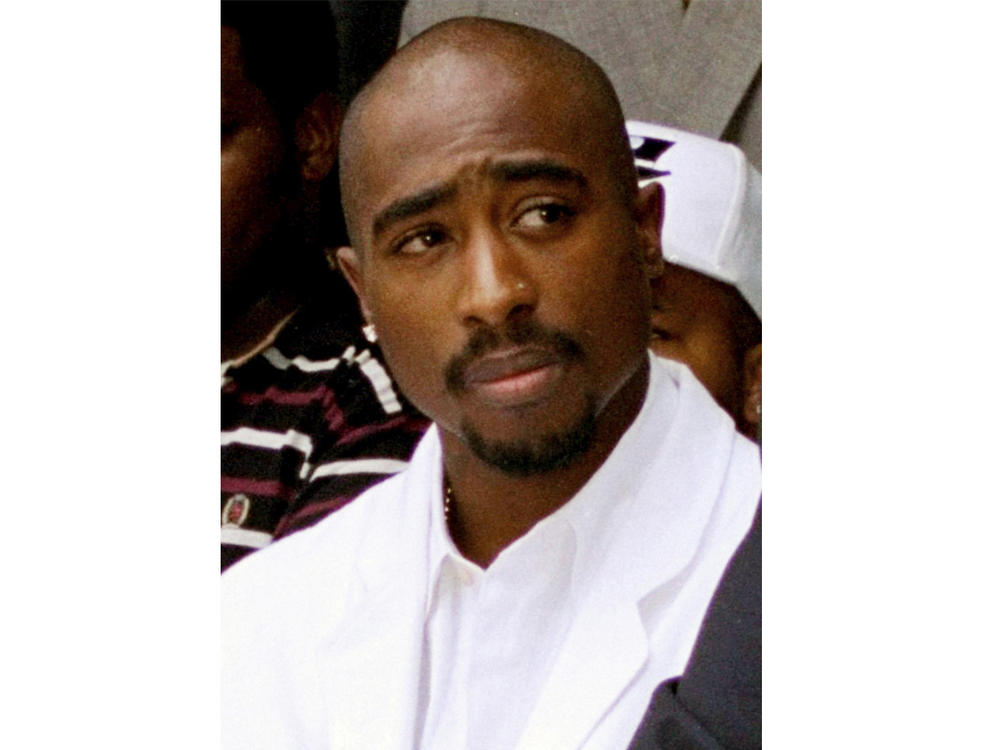Section Branding
Header Content
Las Vegas police investigating Tupac Shakur's 1996 murder have searched a Nevada home
Primary Content
Updated July 20, 2023 at 5:06 PM ET
Las Vegas police executed a search warrant related to the fatal drive-by shooting of Tupac Shakur, the latest turn in decades of investigations into the rapper's mythic and unsolved death.
Shakur was one of the most popular artists in the world at the time of his death at age 25. His legacy only grew after he was shot while driving on the Las Vegas strip in September 1996 and has served as the subject of dozens of books, films, podcasts, documentaries and television shows.
On Monday, the Las Vegas Metropolitan Police Department searched a home in the suburb of Henderson, Nev., about 15 miles from where the shooting occurred.
The department has not publicly released any additional details or a copy of the warrant that was served and declined NPR's request for comment on the investigation.
But the news of the search has already added a fresh layer to years of speculation about the rapper's death, igniting new questions about what the case means — and what a resolution might look like.
How did Tupac die?
Shakur was shot on the night of Sept. 7, 1996, while driving home from a boxing match at the MGM Grand. Before leaving the hotel, Shakur was seen fighting with Orlando "Baby Lane" Anderson, who'd had a previous run-in with a member of Shakur's entourage.
Shakur then departed the hotel as a passenger of a black BMW driven by Marion "Suge" Knight, who was the head of Death Row Records at the time.
While stopped at a red light, a white Cadillac pulled up next to the vehicle and opened fire, shooting Shakur several times. The rapper died from his injuries six days later.
After three decades and multiple investigations, no one has been arrested or charged in connection to the shooting.
Shakur's family filed a civil wrongful death suit against Anderson, who was also named by police as a suspect in the case. Anderson was killed in a gang-related shootout in 1998.
What do we know about the Las Vegas investigation?
During Monday's search, police emerged from patrol cars with their guns drawn, yelling for occupants to leave the house with their hands above their head, according to the Las Vegas Review-Journal, which cited a neighbor.
Residents in Henderson tell The Associated Press they saw officers detain two people as investigators searched the home.
"There were cruisers and SWAT vehicles. They had lights shining on the house," Don Sansouci, a resident in the neighborhood, told the AP. Sansouci said he had just gone to bed with his wife when a slew of police lights woke them up shortly after 9 p.m local time.
According to AP, public records link the home searched to the wife of Duane "Keefe D" Davis, the uncle of Orlando Anderson — one of the late rapper's known rivals.
Authorities have long suspected Anderson in Shakur's death, AP reported.
Anderson, who died in 1998 in an unrelated shooting, denied any involvement in Shakur's death at the time.
Nearly 30 years later, the new developments bring life to the unsolved case
The news of the search was a surprise to those tracking the investigations, such as Santi Elijah Holley, who authored the book An Amerikan Family: The Shakurs and the Nation They Created.
In an interview with NPR, Holley said the police didn't seem to take the initial investigations seriously, even when witnesses revealed, through the media, that they witnessed the shooting. Las Vegas police have said that the investigation was delayed because witnesses refused to cooperate.
"There hasn't been any momentum or movement for so many years," Holley said on Wednesday. "I think the police quietly had a vendetta against him throughout his life, throughout his career."
Shakur baked criticism of law enforcement into his lyrics and spoke out against police harassment in interviews.
In 1991, he sued the Oakland Police Department for slamming him to the ground after he was caught jaywalking. In 1993, he was charged with aggravated assault for shooting two off-duty police officers, but the charges were later dropped.
Copyright 2023 NPR. To see more, visit https://www.npr.org.

